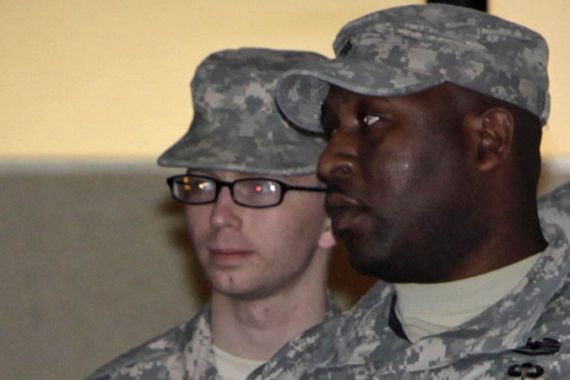Bradley Manning appears in US court
Soldier accused of giving classified US documents to WikiLeaks appeared in public for first time since arrest in 2010.

Bradley Manning, the US soldier accused of giving massive troves of classified US documents to WikiLeaks, has appeared in a military court for the first time at a pre-trial hearing into his case.
Lieutenant Colonel Paul Almanza, the presiding officer, called an end to Friday’s proceedings after advising Manning again of the charges and his rights and rejecting a defence request that he recuse himself from the case.
Almanza said the hearing – which was not to determine Manning’s guilt or innocence but to review the evidence and charges to determine whether he should face a formal court-martial – will resume at 10:00am (15:00 GMT) on Saturday.
Asked by the investigating officer at court whether he had been read the charges and understood his rights, Manning replied: “Yes, sir”.
He also said he was satisfied with his defence counsel.
There was a huge international media turnout for the preliminary hearing at Fort Meade near Baltimore, Maryland, the headquarters of the top secret National Security Agency.
At the opening of the hearing, Manning’s defence team asked Almanza, accused of being biased against the defendant, to recuse himself from the case.
Bias claims
David Coombs, Manning’s defence lawyer, argued that Almanza had rejected most of the witnesses requested by the defence, which had included US President Barack Obama, Secretary of State Hillary Clinton and former Defence Secretary Robert Gates. He said that was evidence of bias.
He also questioned whether Almanza, who is on leave from his job as an attorney with the department of justice, could be impartial while the US authorities are seeking to bring a case against WikiLeaks and its founder Julian Assange.
But Almanza refused the request to step down, saying he was capable of ruling impartially. A member of the prosecution team, Ashden Fein, said the government opposes recusal.
“The United States does not believe you’ve exhibited any bias in any form and that you can render a fair and impartial decision,” Fein said.
Manning is accused of supplying WikiLeaks with US diplomatic cables, videos and military reports from Afghanistan and Iraq while serving as an intelligence analyst on a military base near Baghdad between November 2009 and May 2010.
On March 2011, an additional 22 charges were preferred by prosecutors, including wrongfully obtaining classified material for the purpose of posting it on the internet, knowing that the information would be accessed by the enemy; the illegal transmission of defence information; fraud; and aiding the enemy.
US broadcaster CBS reported that the new charges involved the leaking of the Afghan and Iraq war logs, and a quarter of a million state department cables. In all, CBS said, he is accused of having leaked over half a million documents and two videos.
According to ABC News, the charge sheets said Manning had transferred 380,000 records about Iraq, and 90,000 about Afghanistan.
Prosecutors told Manning’s lawyers they would not seek the death penalty, though the charge of aiding the enemy is a capital offence.
They said, if convicted, he will face life imprisonment, reduction in rank to the lowest enlisted pay grade, a dishonourable discharge, and loss of pay and allowances.